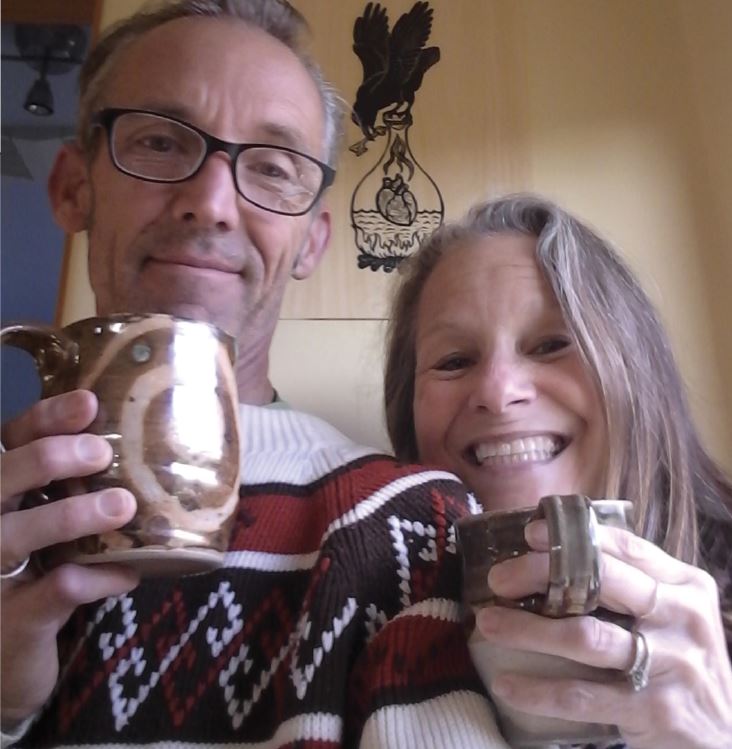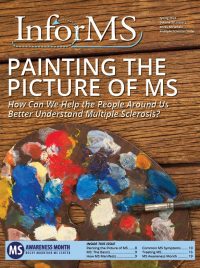
Chris is 57 years old and was diagnosed with MS six months ago. We spoke with Chris and her husband, Jim.
Can you tell us a little about your early symptoms and diagnosis process?
My first symptom was debilitating vertigo, nausea, and vomiting. I couldn’t get out of bed for days. Our first stop was our PCP, then my allergist, and then an ear-nose-and-throat specialist. My PCP — a very perceptive small-town Physician Assistant — ordered an MRI for me. The report showed demyelinating processes, so at that point, we began a search for a neurologist. Early on I was completely overwhelmed. I was unable to trust my body and mind as I had in the past. There were so many questions and uncertainties, and I struggled to tell people what this experience felt like.
Jim, what was it like when Chris began experiencing these early symptoms?
I’m a school nurse and former home-health nurse, so I was immediately trying to solve the mystery & cure my patient. We went through a list of the usual suspects: Benign Paroxysmal Positional Vertigo (with the inevitable failure of the Epley Maneuver), allergies, vestibular neuritis — you name it, we wanted it to be something readily curable.
What does your support system look like?
I have the best support system–my spouse, for starters, & then phone calls with distant family have become much more frequent. Local friends have provided social support, shoulders to lean on, listening ears, and lots of rides to distant doctors’ appointments. Until recently, I couldn’t drive, as a result of my lesions. Oh — and my Best Dog Ever.
How has MS impacted your life?
Chris: I’ve had to stop working, which is huge after a 38-year professional career. I needed PT to help me overcome some of my balance issues, which has allowed me to drive short distances again. Day-to-day life has often felt overwhelming.
Jim: It’s funny — I’m about to turn 60, so a month before the onset of Chris’s symptoms, I spent many hours assessing our fitness for retirement in a few years. We’ve had to rethink some of those initially sunny conclusions–but we’re inclined toward living more simply rather than working longer so that we can still retire on the same timetable. We’ve thought about selling our beloved house — a sad matter to contemplate, but both of us have a built-in ability to make peace with disappointment.
What have been some of the most significant challenges the two of you have faced?
Chris: I spent much of my career as a bereavement counselor, and now I am faced with adjusting to the losses in my life and accepting the oh-so-slow process of grief.
Jim: We’ve been active hikers, cyclists, and explorers throughout our marriage, and we piled up plans for semi-retirement adventures. In recent months, we’ve had to rethink future plans. Also: It’s been difficult watching Chris come to terms with her illness; I like to fix and heal, and I’ve had to step back and realize we’re embarking on a long journey with an uncertain outcome.
Jim, what is something you’ve learned while supporting Chris?
Slowing my pace has allowed me to focus on moments more than goals. Let’s be honest: I’m still working on that.
What is your favorite MS coping mechanism or trick that involves both of you?
I’m pretty dedicated to the MS Gym — online, with Trevor Wicken — which I do almost every day. Elissa Berlinger, Social Worker from the Rocky Mountain MS Center, has been an invaluable support.
What did you not expect?
Chris: My inability to handle more than one input at a time. My cognitive deficits have been most challenging.
Jim: That we might, long-term, expect a high degree of recovery — not a return to a pre-diagnosis status quo, but to a mostly normal life.
How has your perspective of MS changed over time?
Chris: My expectation that I would get better in a linear fashion has been challenged. It’s a roller coaster.
Jim: People have very divergent experiences of MS; there really isn’t a checklist that MS patients carry in their hip pockets to assess their disease course. MS really is different from patient to patient.
What gives you hope?
Chris: The resilience I see in others who are managing this illness with grace and humor and grit. I have an abundance of support that helps me meet my challenges.
Jim: We were fortunate to have received this diagnosis in 2021. Nowadays, there are multitudinous MS therapies and almost annual strides made in treatment modalities. In the near future, we’re likely to see a day when an MS diagnosis is more nuisance than cataclysm.



